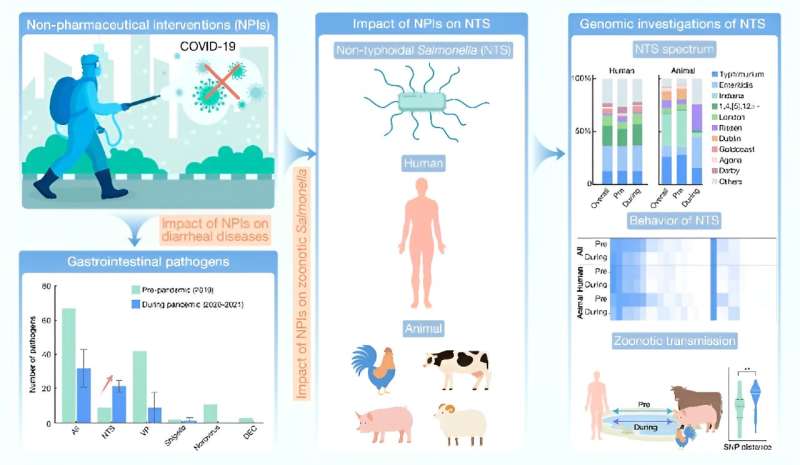This article has been reviewed according to Science X's editorial process and policies. Editors have highlighted the following attributes while ensuring the content's credibility:
fact-checked
proofread
Impact of COVID-19-related nonpharmaceutical interventions on diarrheal diseases and zoonotic Salmonella

Non-pharmaceutical interventions (NPIs) have been proven effective in reducing the spread of COVID-19, but their broader impact on gastrointestinal disorders remains poorly studied. Non-typhoidal Salmonella (NTS) infections are primarily self-limiting diarrheal illnesses with a high case fatality rate in certain regions. Systematic investigation of the genetic characteristics and transmission pathways of NPIs in China is lacking.
A study was conducted by Linlin Huang (Department of Veterinary Medicine, Zhejiang University College of Animal Sciences, Zhejiang, China) and Haiyang Zhou (Department of Veterinary Medicine, Zhejiang University College of Animal Sciences, Zhejiang, China; Hainan Institute of Zhejiang University, Hainan, China).
This study analyzed acute diarrhea outpatient cases pre- and during the COVID-19 in Hangzhou, China. The results showed that NPIs implemented during the pandemic were significantly affected by outpatients' age and occupational distribution. While the detection rate of most foodborne pathogens declined, there was an abnormal increase in the detection rate of NTS. The study is published in the journal hLife.
Through tracking research on patients' diets, the researchers speculate that COVID-19-related NPIs may have reduced the frequency of dining out, leading to more homemade meals, which may increase the risk of NTS transmission through consuming contaminated meat.
Furthermore, it was observed that the invasiveness index of NTS decreased significantly during the pandemic, suggesting that the abnormal behavior of NTS might be associated with its enhanced colonization ability in the intestine, leading to an increase in the incidence of acute diarrhea.
Furthermore, the researchers conducted whole genome sequencing analysis on NTS samples from human and animal sources. The analysis revealed dynamic changes in NTS serotype patterns during the pandemic and significant reductions in both resistance and virulence.
These changes exhibited notable differences between human and animal samples. SNP analysis results showed that during the pandemic, the possibility and frequency of zoonotic transmission events caused by NTS showed a downward trend. These findings suggest an unexpected positive impact of COVID-19-related NPIs in controlling NTS. The elevating cases during the COVID-19 further indicate pathways other than food- or meat-borne for Salmonella transmission.
The findings may have broader implications beyond China, which promote an improved understanding of the indirect effects of COVID-19 on enteric pathogen infections, or pathogens with a different transmission route, in other countries. The knowledge gained can aid in developing adequate contingency plans for appropriate strategies against gastrointestinal infections.
More information: Linlin Huang et al, Impact of COVID-19-related nonpharmaceutical interventions on diarrheal diseases and zoonotic Salmonella, hLife (2024). DOI: 10.1016/j.hlife.2024.03.005



















